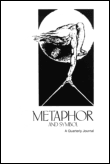
METAPHOR AND SYMBOL
Scope & Guideline
Exploring the Depths of Language and Thought
Introduction
Aims and Scopes
- Cognitive Linguistics and Metaphor:
The journal emphasizes the cognitive aspects of metaphor usage, investigating how metaphors influence thought processes, reasoning, and emotional responses. - Multimodal Metaphor Analysis:
Research often incorporates visual and multimodal elements, analyzing how metaphor transcends verbal language to include images, gestures, and other forms of communication. - Cultural and Contextual Studies of Metaphor:
The journal explores metaphors within specific cultural and social contexts, studying how cultural narratives shape metaphorical expressions and their interpretations. - Interdisciplinary Approaches to Metaphor:
The journal promotes interdisciplinary research, bridging linguistics, psychology, literature, and social sciences to provide a holistic view of metaphor's role in human cognition and culture. - Methodological Innovations:
There is a consistent focus on developing new methodologies for analyzing metaphors, including computational and qualitative approaches, enhancing the rigor of metaphor studies.
Trending and Emerging
- COVID-19 and Metaphor:
A significant trend is the exploration of metaphors related to the COVID-19 pandemic, examining how language shapes public perception and response to health crises. - Emotional and Psychological Impacts of Metaphor:
Increasing attention is being given to the emotional and psychological dimensions of metaphor usage, particularly in contexts of trauma, mental health, and personal narratives. - Visual and Multimodal Metaphors:
There is a growing interest in visual and multimodal metaphors, reflecting how different forms of communication interact and convey meaning in contemporary discourse. - Metaphor in Digital Communication:
Research is increasingly focusing on metaphors in digital contexts, such as social media and online discourse, highlighting their role in shaping public narratives and identity. - Methodological Advances in Metaphor Research:
Emerging methodologies, such as corpus-based analyses and computational approaches, are gaining traction, reflecting a shift towards more empirical and data-driven studies in metaphor research.
Declining or Waning
- Traditional Literary Metaphor Analysis:
Research focusing solely on traditional literary metaphors, such as those found in poetry and prose, appears to be waning in favor of more cognitive and contextual approaches. - Static Metaphor Studies:
There is a noticeable reduction in studies that treat metaphors as fixed entities, moving instead towards dynamic analyses that consider metaphor's evolution and contextual variability. - Historical Metaphor Comparisons:
Studies comparing historical metaphors across time periods are becoming less frequent, with a shift towards contemporary applications and immediate cultural relevance. - Simplistic Interpretations of Metaphor:
The journal seems to be moving away from simplistic or reductive interpretations of metaphor, favoring more nuanced and comprehensive analyses that consider multiple layers of meaning.
Similar Journals
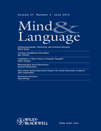
MIND & LANGUAGE
Connecting Ideas Across Linguistics, Philosophy, and CognitionMIND & LANGUAGE, published by WILEY, is a premier academic journal that has established itself as a leading platform for interdisciplinary research at the intersection of linguistics, philosophy, and cognitive science. With a noteworthy impact factor and a remarkable ranking in the top quartiles (Q1) for both Linguistics and Language as well as Philosophy, it reflects the journal’s robust contribution to the academic community, garnering attention from researchers and scholars worldwide. Since its inception in 1986, MIND & LANGUAGE has provided an avenue for exploring the complexities of language perception, cognitive processes, and the philosophical implications of linguistic studies. Its comprehensive scope ensures that it remains a critical resource for professionals and students alike who are engaged in the exploration of language's role in human thought and society. The journal's rigorous peer-review process guarantees the high quality and scholarly integrity of the published work, making it an essential addition to any academic library.

Functions of Language
Innovating Understanding in Linguistics and Language StudiesFunctions of Language, published by John Benjamins Publishing Co, serves as a vital platform for scholars and practitioners in the fields of linguistics and language studies. With its ISSN 0929-998X and E-ISSN 1569-9765, this esteemed journal, based in the Netherlands, has solidified its reputation through a focused dedication to exploring the multifaceted roles that language plays across various contexts. Ranked in the top percentile of leading journals in Linguistics and Language (Q2 category, 2023) and holding impressive Scopus ranks within both the Arts and Humanities and Social Sciences sectors, the journal emphasizes research that interlinks theoretical insights with practical implications. Functions of Language aims to advance our understanding of linguistic structures and their applications, making it an essential resource for researchers, professionals, and students alike who are eager to contribute to the evolving discourse in language studies. With content converging from 1994 to 2024, the journal reflects ongoing scholarly engagement and innovation in the field.
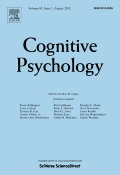
COGNITIVE PSYCHOLOGY
Unraveling the Mysteries of the MindCOGNITIVE PSYCHOLOGY is a premier academic journal published by Academic Press Inc. Elsevier Science, specializing in the dynamic and evolving field of cognitive psychology. With a significant history spanning from 1970 to 2024, this journal has established itself as a critical resource for researchers and professionals alike, boasting a distinguished ranking in the Q1 category across multiple disciplines, including Experimental and Cognitive Psychology, Neuropsychology, and Artificial Intelligence. Its impact factor, reflective of its influence and reputation within the academic community, positions COGNITIVE PSYCHOLOGY as an essential platform for disseminating cutting-edge research and theoretical advancements. Although it is not open access, subscribers gain exclusive insights into the latest findings that drive the field forward. The journal's commitment to fostering innovative research makes it an indispensable tool for those dedicated to understanding the complexities of human cognition.
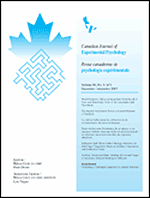
CANADIAN JOURNAL OF EXPERIMENTAL PSYCHOLOGY-REVUE CANADIENNE DE PSYCHOLOGIE EXPERIMENTALE
Connecting Minds: Bridging Research and PracticeCanadian Journal of Experimental Psychology / Revue canadienne de psychologie expérimentale (ISSN 1196-1961, E-ISSN 1878-7290), published by the Canadian Psychological Association, serves as a vital resource in the fields of Experimental and Cognitive Psychology and general psychological research. With a respectable impact factor that places it in the Q3 category for both Experimental Psychology and miscellaneous Medicine (2023), this journal offers a platform for innovative research that furthers our understanding of psychological processes. Spanning years from 1993 to 2024, it connects researchers, professionals, and students to contemporary findings and methodologies, fostering a collaborative environment for the advancement of psychological science. Though it does not currently offer Open Access, the journal's commitment to quality and relevance in psychological research continues to make it an important part of the academic landscape, supporting the dissemination of knowledge within a global community.

Biolinguistics
Innovating Research at the Intersection of Cognition and CommunicationBiolinguistics, published by the University of Cyprus, Department of English Studies, is a distinguished Open Access journal that has been at the forefront of exploring the intricate relationships between biology and language since its inception in 2007. With an ISSN of 1450-3417 and an impressive presence in both Experimental and Cognitive Psychology and Linguistics, this journal ranks in the Q4 and Q3 Quartiles respectively, indicating its significant contribution to these fields. Situated in Nicosia, Cyprus, the journal aims to bridge interdisciplinary gaps, drawing insights from cognitive science, linguistics, and biological studies, making it essential reading for researchers, professionals, and students. With current Scopus rankings placing it in the 77th percentile for Language and Linguistics and a 20th percentile in Experimental and Cognitive Psychology, Biolinguistics continues to make an impactful mark on the academic community. As you delve into its enriching content, you can expect rigorous peer-reviewed articles that pave the way for innovative research and discourse within the realm of biolinguistics.
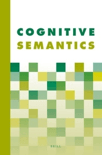
Cognitive Semantics
Diving Deep into the Semantics of ThoughtCognitive Semantics, published by BRILL, is a leading academic journal dedicated to the intricate study of cognitive processes underlying language use and semantic meaning. With its ISSN 2352-6408 and E-ISSN 2352-6416, this journal contributes significantly to the fields of linguistics and language studies, reflecting its importance in contemporary research on cognitive linguistics. Over its publication span from 2015 to 2024, it has established a niche as a Q3 ranked journal in the Linguistics and Language category for 2023, showcasing its relevance and growing influence in the academic community. Although currently not open access, the journal aims to provide a robust platform for exchanging ideas, theories, and methodologies related to cognitive semantics, fostering interdisciplinary dialogue among researchers, professionals, and students. Readers can expect to uncover valuable insights into the cognitive mechanisms that shape our understanding of language, making this journal an essential resource for anyone involved in linguistic research.
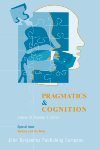
Pragmatics & Cognition
Bridging Disciplines Through Language and CognitionPragmatics & Cognition, published by John Benjamins Publishing Co, is an esteemed journal that serves as a cross-disciplinary platform for the study of language, cognition, and context-dependent communication. With its ISSN 0929-0907 and E-ISSN 1569-9943, the journal has established a notable reputation since its inception in 1993, although its coverage spans various fields from behavioral neuroscience to linguistics and philosophy. Recognized for its scholarly contributions, it holds impressive Scopus rankings, significantly within Linguistics and Language, where it ranks in the 63rd percentile among peers. Although it currently maintains a Q4 designation in Behavioral Neuroscience and a Q1 in Linguistics and Language as of 2023, the journal appeals to a diverse audience addressing the intricate relationships between language use and cognitive processes. As researchers and academics navigate this evolving landscape, Pragmatics & Cognition remains pivotal in fostering essential dialogues and advancing knowledge in the interdisciplinary field, providing rich content that is both insightful and relevant.
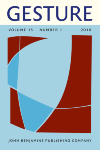
Gesture
Decoding the silent language of human expression.Gesture, published by JOHN BENJAMINS PUBLISHING CO, is a leading interdisciplinary journal that focuses on the study of human gestural communication as a rich field for linguistic and cognitive research. With an ISSN of 1568-1475 and an E-ISSN of 1569-9773, the journal has been influential since its inception in 2001, providing a vital forum for researchers and professionals studying the interplay between gesture and language. It significantly contributes to various academic fields, evidenced by its remarkable rankings, including Q1 in Cultural Studies and Q2 in Linguistics and Language as of 2023. While it does not offer Open Access, its high impact in scholarly communication makes it indispensable for anyone wanting to explore the nuances of non-verbal expression. The journal maintains a dynamic scope, converging scholarship from 2001 to 2014 and continuing robustly from 2016 to 2024, solidifying its position in the social sciences sector, particularly in the realms of communication, cultural studies, and cognitive psychology. Gesture is published from the Netherlands, and its esteemed reputation ensures that it attracts contributions from top-tier researchers worldwide, making it a crucial resource for advancing knowledge and understanding in the field.
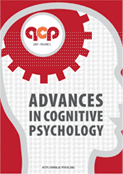
Advances in Cognitive Psychology
Championing Open Access to Psychological KnowledgeAdvances in Cognitive Psychology is a premier peer-reviewed journal published by UNIV ECONOMICS & HUMAN SCIENCES WARSAW, dedicated to the exploration of psychological processes underlying cognition. With its open access model implemented since 2005, the journal facilitates wide-ranging dissemination of cutting-edge research across various branches of psychology, including applied, clinical, experimental, and cognitive psychology. Despite its modest standing in terms of impact factor, reflected in its Q3 and Q4 rankings across numerous subfields, it remains an important platform for emerging researchers and seasoned professionals alike, aiming to foster insight into complex mental processes and enhance understanding of behavioral patterns. The journal's commitment to accessibility empowers a diverse community of readers, including students, to engage with innovative studies and reviews, contributing to the collective knowledge within the psychological sciences. Located in Poland, Advances in Cognitive Psychology is open for submissions from worldwide researchers, encouraging a global perspective on cognition and behavior.
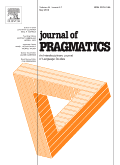
JOURNAL OF PRAGMATICS
Advancing Knowledge in Pragmatics and BeyondJournal of Pragmatics, published by Elsevier, is a premier interdisciplinary journal dedicated to the exploration of language use as a dynamic social phenomenon. Established in 1977 and set to continue through 2024, it serves as a vital resource for researchers across various fields, including Artificial Intelligence, Linguistics, and Language Studies. With an impressive Q1 ranking in Linguistics and Language and a Q2 ranking in Artificial Intelligence, the journal has made significant contributions, supporting a diverse range of theoretical and empirical research. It boasts a solid reputation, evidenced by its strong positions in Scopus rankings—occupying the 91st percentile among the best in the Social Sciences and 92nd in Arts and Humanities. Although it does not currently offer open access, the Journal of Pragmatics remains essential for professionals and scholars seeking to deepen their understanding of pragmatics and its applications in language technology, societal interaction, and cognitive processes. With its international reach and high standards, this journal is a cornerstone for anyone dedicated to advancing knowledge in the fields of language and communication.